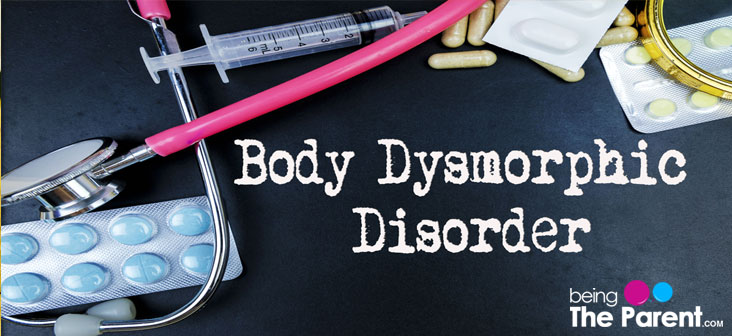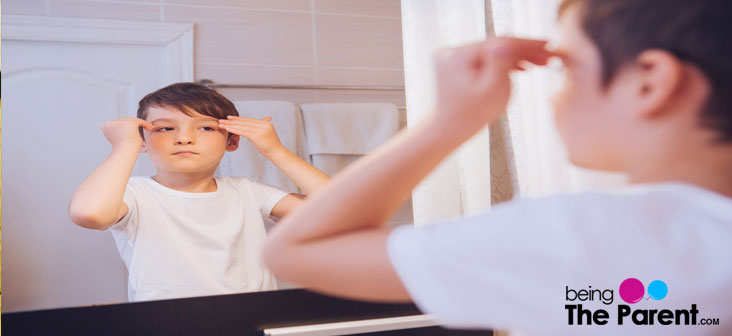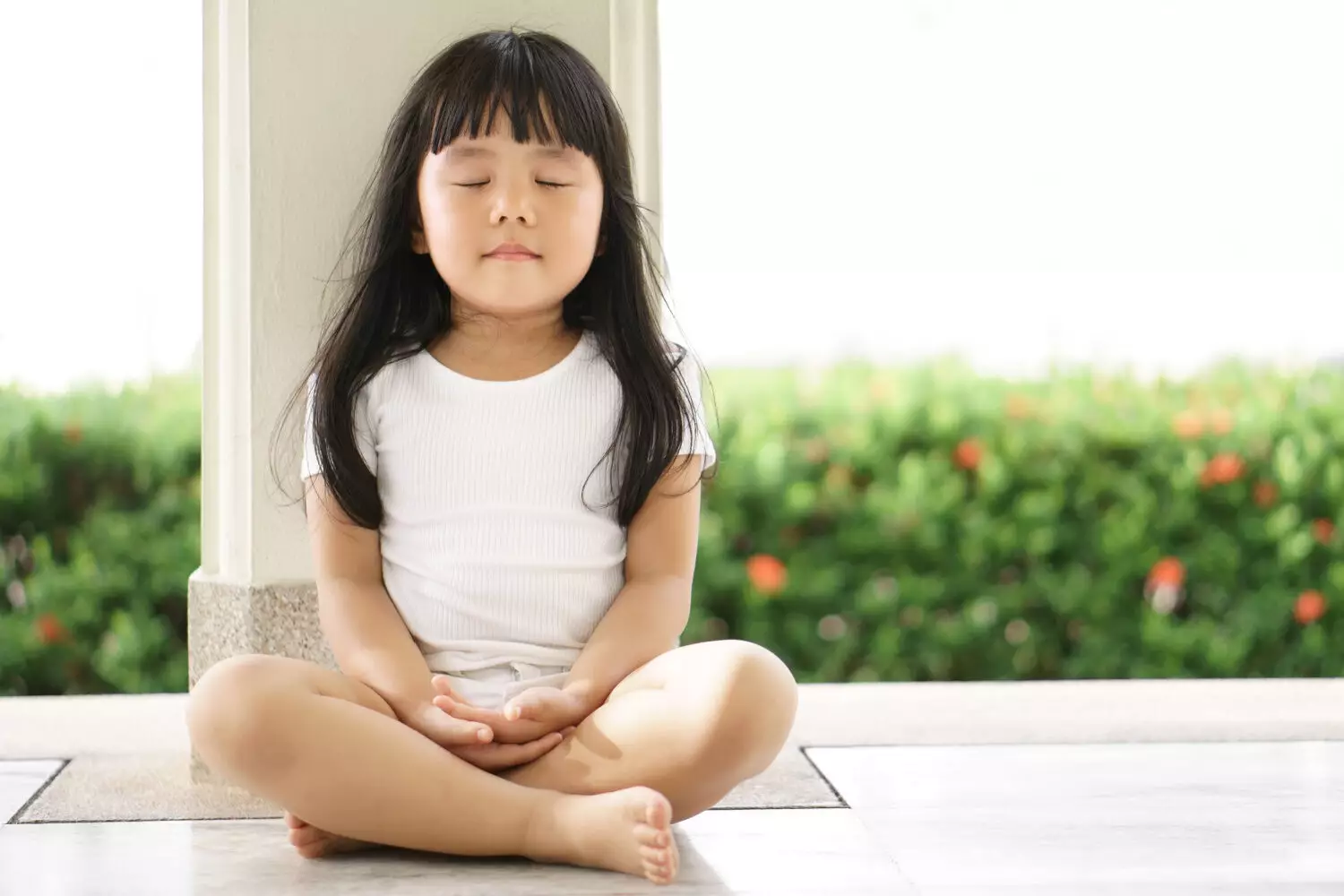
All About Body Dysmorphic Disorder (BDD) In Children
4 min readWritten by Editorial Team

We all spend a lot of time in front of the mirror evaluating our looks. It is quite natural some of us spend more time in front of the mirror wishing to be presentable on different occasions. Most of us are not satisfied with a lot of our body features and wish to have a better-shaped nose, better smile, and better hair and so on. This holds true for kids too specially preteens and teens for whom body image is one of the major part of their self-esteem.

Kids And Body Image
Today the kids are undergoing a lot of changes physically, mentally and emotionally at an early age. What held true for teenagers’ couple of years ago holds true today for kids in the age group of 10-12 years. Tweens as we call them are now becoming more conscious of their body image.
We can often see them feel disappointed with some feature of their appearance. This can all be attributed to part of growing up as long as it does not haunt them continuously and hinder their daily activities. However, for some kids, concerns about appearance become exceptionally intense and disturbing. This should not be ignored, as this can be the sign of a mental disorder called Body Dysmorphic Disorder (BDD).
What Is Body Dysmorphic Disorder?
BDD is a self-perception issue, which is characterized by inordinate worry over either an exceptionally minor or totally envisioned “imperfection” in one’s physical appearance that others are not able to see or notice. As a result, individuals with this issue consider themselves to be unattractive or “monstrous” and often maintain a strategic distance from social exposure or consider undergoing a plastic surgery for improving their appearance.
Usually, the onset of BDD happens during late childhood or early adolescence. Children with BDD can excessively worry about any part of their body. However, more often they find fault with their hair, skin (color, freckles, texture, moles, and acne), nose, chest, or stomach. They often compare themselves with their friends, celebrities or media personality. This unnecessary stress, can affect the child’s ability to lead an active life at home, at school, and in any public places and occasions. Read: Tips For Parenting A Highly Sensitive Child
What Are The Symptoms Of Body Dysmorphic Disorder?
Children with Body Dysmorphic Disorder exhibit the following signs.
- Frequent evaluation: They frequently examine the part that worries them in front of the mirror. They often take measurements if the size of any body part is their concern
- Develops aversion: The child start to develop aversion and tends to avoid:
- Looking into his or her reflection, if he or she is worried about the looks
- Food, if then child is worried about gaining weight
- Social appearance
- Taking the photographs
- They tend to spend time alone
- They show signs of depression and social anxiety
- They have trouble sleeping
- They compare his or her look with others
- They tend to wear too much makeup to hide the so-called defects
- They habitually touch the part that worries them
- They tend to wear excessive clothing irrespective of the climate and occasions to cover-up perceived flaws
- They are extremely self-conscious and depressed
- They exercise excessively if they thinks they are very fat or don’t have enough muscles

Who Are At The Risk Of Developing Body Dysmorphic Disorder?
Certain factors can increase the risk of the child for developing body dysmorphic disorder:
- Children with a close relative who has obsessive-compulsive disorder are more likely to develop body dysmorphic disorder
- Parents and others who regularly censure the child’s look pave the way for the child to develop BDD. Read: Stop Comparing Your Child With Others
- Children who have encountered neglect and abuse are also at risk. Read: Child Abuse: How To Tell If Your Child Is Being Abused?
What Causes Body Dysmorphic Disorder?
The causes of BDD are unclear. However, experts believe the body dysmorphic disorder may result from a combination of causes, such as:
- Abnormalities in brain structure: Research indicates that patients who are diagnosed with this disorder tend to have lower levels of serotonin than what is considered normal. Malfunctioning of serotonin in the brain is known to cause depression and other mood swings
- Genetic cause: Some researches indicate that the body dysmorphic disorder is more common in children who have nearby relations who experience BDD or obsessive-compulsive disorder. This puts forward the genetic cause of BDD
- Circumstances: The circumstances, both social and domestic, in which the child grows contributes to BDD. If the child is subjected to abuse, bullying, or neglect, he or she can be at the risk of BDD
How To Treat Body Dysmorphic Disorder?
Once you know your child has BDD, the first step is recognizing the real issue causing the distress. Help from a professional therapist is always recommended as it will be easier to find underlying issue and coexisting disorder (usually BDD coexist with other mental disorders) thereby, you are able to plan an effective treatment. Generally, visiting therapist in the clinic for treatment is enough. Psychiatric hospitalization may be required only in very extreme cases.
Treatment for BDD likely will include a combination of the following therapies:
- Psychotherapy: Psychotherapy is a method to diagnose, manage, and treat psychological and emotional problems by spending time with a trained psychotherapist
- Cognitive behavioral therapy: It is a short-term, problem-focused form of behavioral treatment
- Medication: The medications most frequently prescribed are the selective serotonin reuptake inhibitors as SSRIs appear to be more effective for body dysmorphic disorder than other antidepressants
- Mind-body practices: Meditation and other “mind-body” practices like yoga, prayers, etc. can help increase the self-confidence of the child
- Family therapy: Family support is very important to treatment success. Therefore, for better results, the other members of the family of the child should also attend the therapy session. This will help to manage the child well at home
As a parent, you want to teach your child that there is much more than appearance. You child’s self-image should include his personality and character abilities. You must also imbibe in your child that he is unique and has his own strengths and interests. As a parent you want your child to appreciate and care for his body and take pride in how he/she looks.

Editorial Team,
With a rich experience in pregnancy and parenting, our team of experts create insightful, well-curated, and easy-to-read content for our to-be-parents and parents at all stages of parenting.Read more.
Responses (0)
Want curated content sharply tailored for your exact stage of parenting?
Sponsored content
Discover great local businesses around you for your kids.
Get regular updates, great recommendations and other right stuff at the right time.











